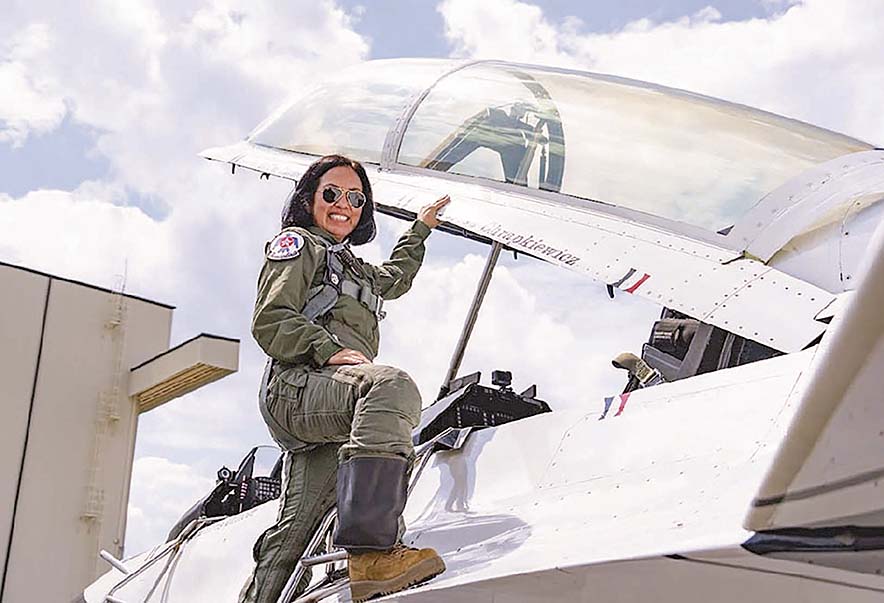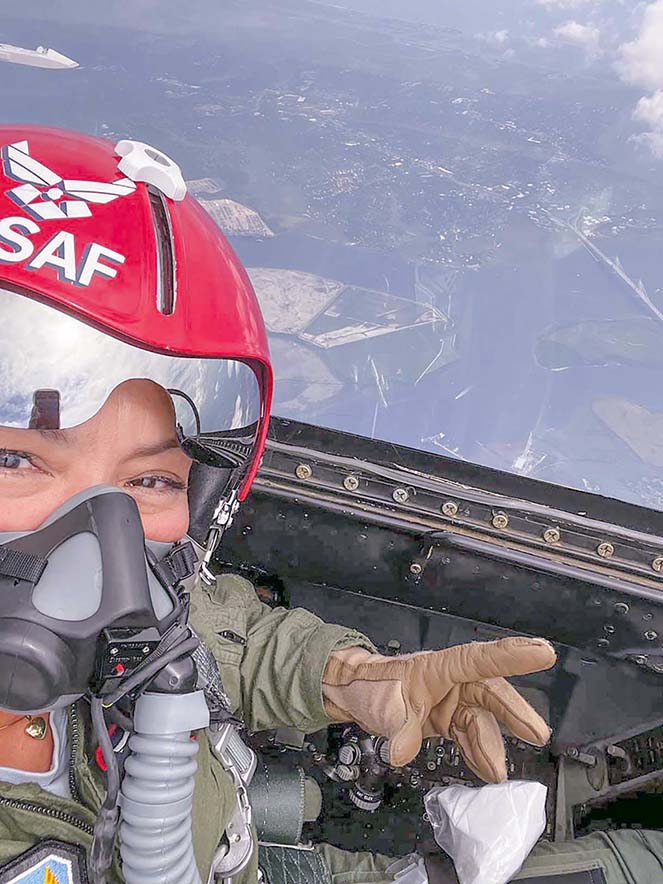
‘A Navajo girl’s dream’: Diné’ asdzą́ą́ pilot soars as a hometown hero

Courtesy | U.S. Air Force Staff Sgt. Breanna Klemm
Diné pilot Teresa Lynch-Chrapkiewicz poses with a standard Air Force jet with her name on it.
WINDOW ROCK – Out of 200 nominees, Teresa Lynch-Chrapkiewicz, the first Diné woman to receive an FAA private pilot license in 1998, was selected as the “2024 Hometown Hero” in Charleston, South Carolina.
Roughly 17 nominations were received by fellow teachers, volunteers, and students at Rise Academy, where Lynch-Chrapkiewicz works as a science teacher.
This nomination highlights the exceptional service and remarkable character that impacts the Charleston community.

Courtesy | Teresa Lynch-Chrapkiewicz
Teresa Lynch-Chrapkiewicz flies in an F-16 with the Air Force Thunderbirds near the Arthur Ravenel Jr. Bridge in Charleston, S.C. According to Lynch-Chrapkiewicz, she asked the pilot in command to fly over to capture the bridge in the background.
As a teacher, published author, pilot, and a U.S. Air Force veteran, Lynch-Chrapkiewicz had earned a once-in-a-lifetime opportunity to ride as a civilian in the backseat of a Thunderbird F-16 Fighting Falcon during the Charleston Airshow April 20-21 in Charleston, South Carolina, where Lynch-Chrapkiewicz resides with her family.
Although familiar with the F-16, where she was able to fly one herself in previous years.
“It put that love and experience back in my heart,” she added regarding flying again. “Never thinking ‘I’d be chosen,’” but she was.
In February, the Joint Base Charleston notified Lynch-Chrapkiewicz when Col. Michael Freeman of the 628th Air Base Wing and JB Charleston commander astounded Lynch-Chrapkiewicz during work when she was talking to a colleague.
It was a humbling experience for her, especially flying in a specific plane, the Thunderbird F-16 Fighting Falcon.
Lynch-Chrapkiewicz is Honágháahnii and born for ‘Áshįįhí. Her late parents are Patrick Lynch Sr. and Francis Chester.
Honágháahnii strong
Born in Farmington, Teresa Lynch-Chrapkiewicz enlisted as an airman with the 161st Air Refueling Wing in the Arizona Air National Guard after she graduated from Del Norte High School in Albuquerque.
While pursuing her military aviation duties, she continued to challenge herself by earning a bachelor’s degree from Arizona State University.
“I gave everything in my heart,” said Lynch-Chrapkiewicz.
While receiving her FAA private pilot license in 1998, she continued to excel in her career and holds a commercial pilot certificate with a multiengine and instrument rating.
She served as a life support technician while in the Reserve at Luke Air Force Base and Arizona Air National Guard, where she worked directly with pilots and conducted reoccurrence training for land, water, and any evacuation.
With airlines, she said, they go through initial training, and each year they’re hired, they must have recurrent training on all the safety equipment in the aircraft, like oxygen masks, G-suits, and night vision goggles. Lynch-Chrapkiewicz had to learn to service them by taking them apart and piecing them back together.
Detailing her journey as the first Diné woman pilot, she wrote a children’s book called “The Yaz Tree Recipe: A Navajo Girl’s Dream.”
Additionally, Lynch-Chrapkiewicz worked with the late Sally Ride, the first American woman in space, at a Sally Ride Science Festival in Arizona. And actively supports the South Carolina Department of Children’s Advocacy by being involved with the Cass, Elias MacArthur Guardian Ad Litem program, which supports children in the Summerville court system.
On weekends, she dedicates time to feeding the hungry through River Ministry, a program she co-founded with a close friend.
Although in a field where there is not much Indigenous representation nor Indigenous women representation, Lynch-Chrapkiewicz advocates those emerging voices to break the cycle and be a voice for yourself and your tribe.
“I just really want Navajo girls to have that voice,” said Lynch-Chrapkiewicz. “Don’t let anything hold you back.”
Although she shared that she put off aviation, she still reflects on how the field allowed her to learn about herself.
As in many fields, she emphasized that all the hard work and dedication would be well worth it. Especially from a Diné perspective, where few have a role in aviation.
But she encourages seeking a field where there is less representation of Indigenous people, let alone Indigenous women, enabling them to keep pursuing because in a field like aviation, “flying doesn’t know skin color.”







 Highway 264,
Highway 264, I-40, WB @ Winslow
I-40, WB @ Winslow